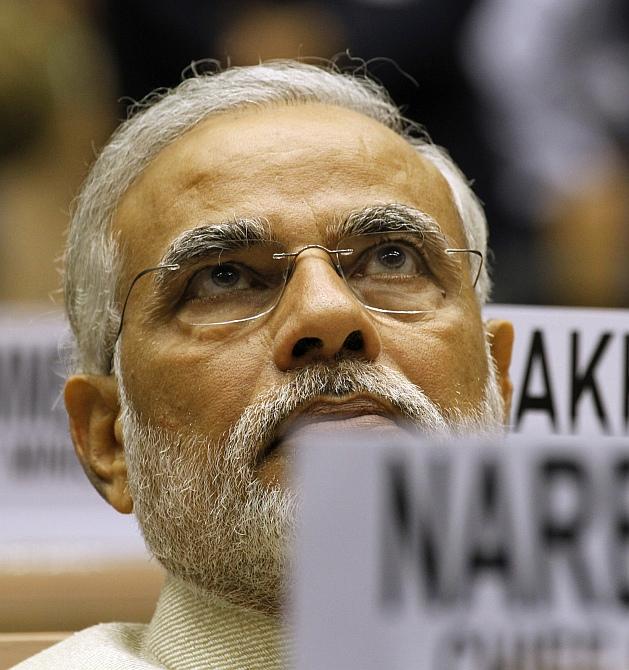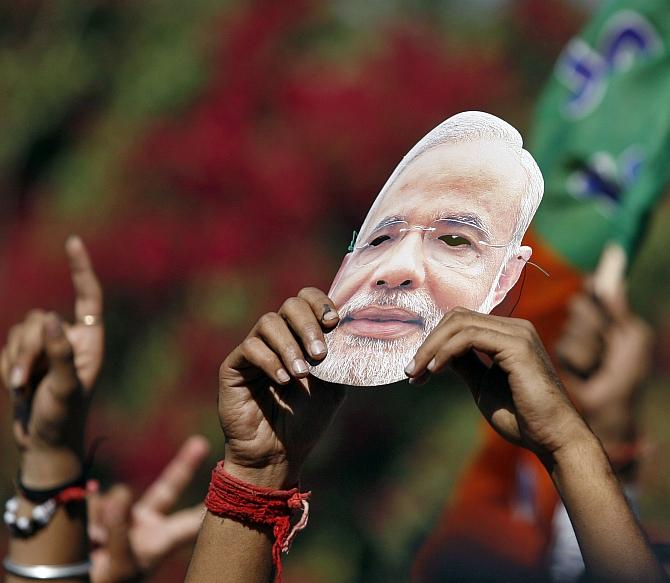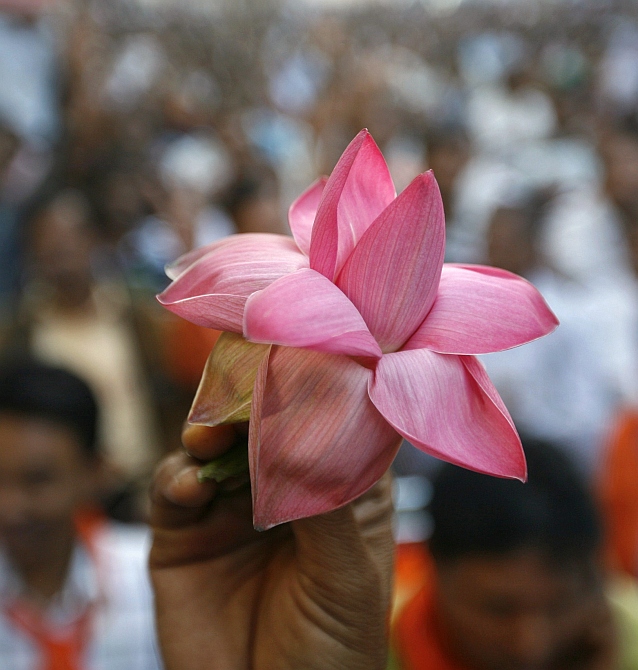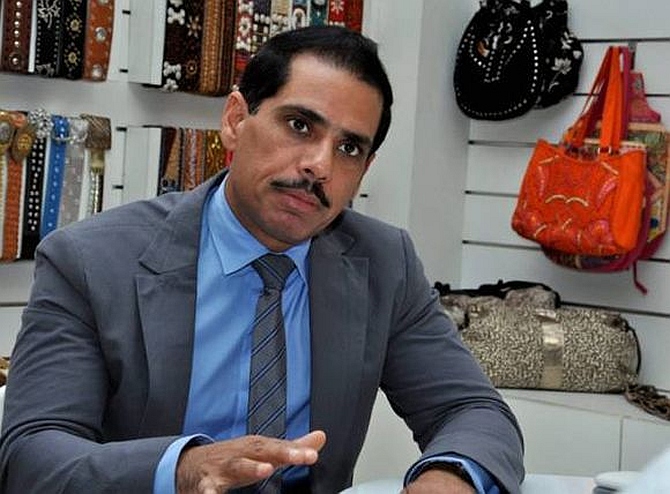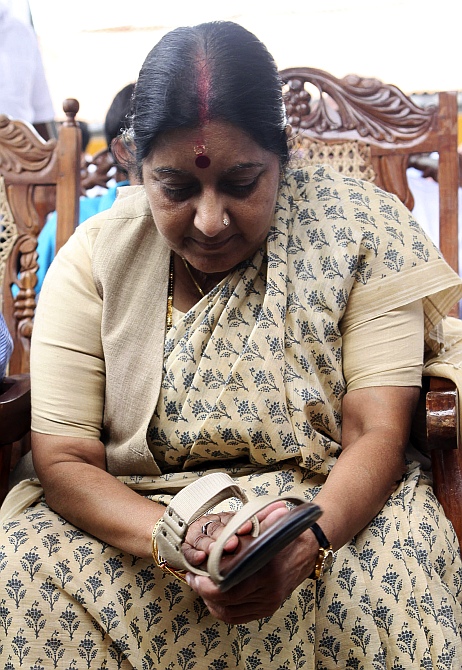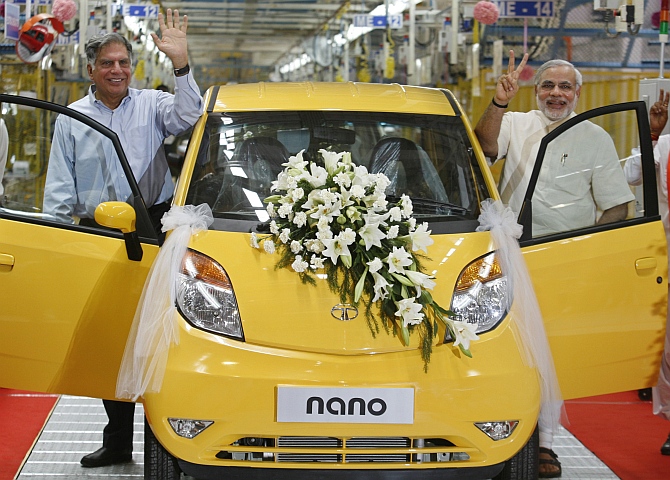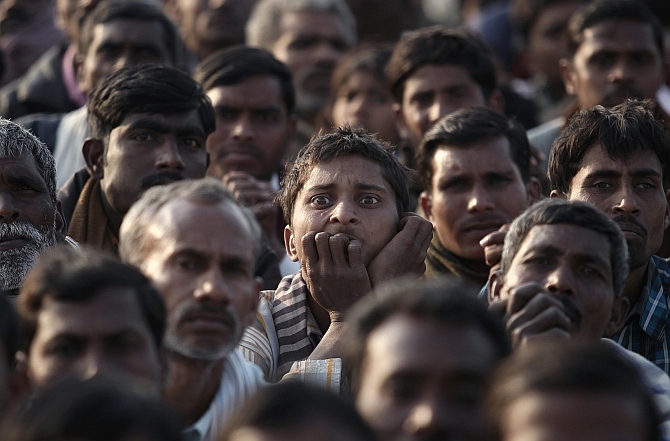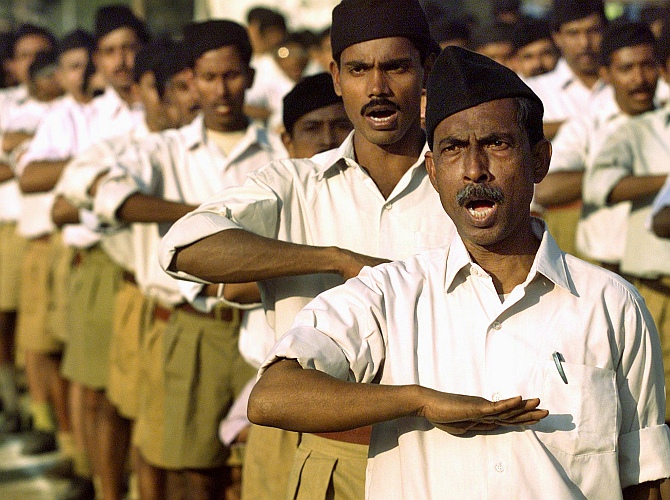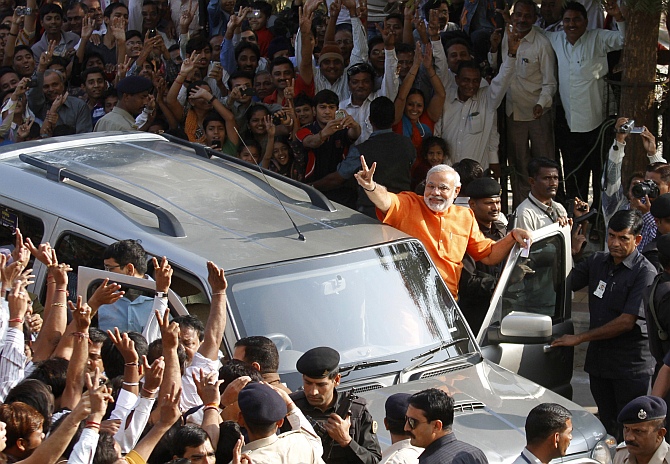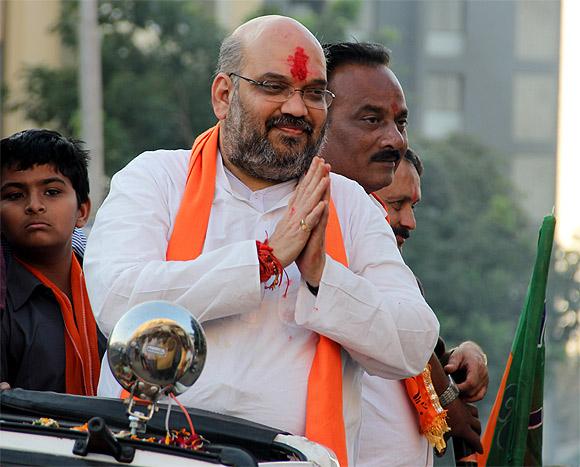 | « Back to article | Print this article |
Polarisation or development? Narendra Modi's big dilemma
After a SWOT analysis of the UPA, Sheela Bhatt examines how its prime challenger squares off. ‘In the public space Modi enjoys many advantages the BJP doesn’t. At same time, there are many advantages to the BJP which Modi doesn't enjoy.’
STRENGTHS
Gains by default
The United Progressive Alliance has lost its moorings. It’s in power without a national purpose. The Congress’s last-ditch effort to save the ground beneath its feet by enacting populist legislations makes its tainted sarkar look vulgar even as the Indian economy is taking a hit. The UPA’s time seems to be over for two reasons. It has no strong leadership to offer. Second, it has brought “uncertainties of the future” into the psyche of Indian voters.
The Indian voter -- highly religious, emotional and quite superstitious, but realistic too -- approaches national insecurities with a complex mindset. Being the largest opposition party the BJP is set to gain, but that’s more due to the weaknesses of the ruling party and less because of its own merit. This is the biggest strength going for the BJP.
This argument will be boosted in the coming weeks as L K Advani, Sushma Swaraj and Shivraj Singh Chauhan brace for a final showdown in their battle to stump Gujarat Chief Minister Narendra Modi from becoming the party’s prime ministerial candidate. In spite of the mediocrity shown at many levels, the BJP has an edge over the Congress. How much and from which areas the BJP can gain are debatable, but the BJP is set for upward mobility.
Depressing economy/price rise
The UPA government’s multi-million advertisements of Aadhar and Bharat Nirman are not mesmerising enough to make the people forget that even the humble lauki and brinjal now cost not less than Rs 100 for two meals for a family of four. Depressed economy is bad for the people but obviously it’s an advantage for the Opposition. The disillusionment of the corporate classes with Prime Minister Manmohan Singh’s ability to handle the economy has also contributed to the gloom. Since the last three years, nobody in the government is actually aware of the direction in which India is going.
Click NEXT to read further...
Modi magic engulfs Sanghis Congress's mindset is defensive
This is one clear advantage for the BJP. The Congress’s moves and attacks are all an act of defence. Whether misusing the CBI, or the government’s desperate act of passing legislations with multimillion-rupee effect on India’s financial health, they are all an attempt to keep afloat.
In Uttar Pradesh the first thing Congressmen were told by Rahul Gandhi’s men was to concentrate and retain the 22 seats the party won in 2009 -- a very defensive thought. It will be a challenge for Rahul Gandhi to see that defeatism does not creep into the Congress workers. That will be an easy advantage for regional parties and the BJP.
Gandhis versus chaiwala
Come election and see a political clash unleashed like never before. It is a cliché all right but it’s also apt to say that the 2014 election will see a no-holds-barred battle between the BJP and Congress.
In the middle of all kinds of promises and selling of dreams, Gujarat Chief Minister Narendra Modi wants to pitch himself versus the Gandhis by selling the line that ‘Once upon a time I was a humble chaiwala running a tea stall near Ahmedabad bus stand. It is the greatness of Indian democracy and my party that a person from such a modest background is today given the chance to lead our great country.’
Dream merchant
All elections are essentially an exercise in trading dreams. It’s the BJP’s strength today that Modi is a genius in selling dreams. We know how truths, half-truths and even lies all can be woven neatly into a national dream.
Click NEXT to read further...
Allies-friendly BJP
The National Democratic Alliance experiment shows that the BJP handled its allies better than the Congress which is known to be arrogant. Many small and regional party leaders find the BJP more approachable than 10, Janpath.
The BJP, like the Congress, harbours contempt for regional parties but is more realistic in dealing with them. Also, there is a UPA fatigue among some two dozen important regional parties.
As only the Gandhis matter in the Congress the interests of coalition politics are secondary to protecting their agenda. The Modi’s camp quite confidently claim that, ‘After the election a new definition of secularism will emerge. It will start with the BJP getting 170-plus seats.’
Modi is confident that the allies will not declare him untouchable if his charisma helps the BJP win 180 seats.
It seems that in the Gangetic plain of India Modi has established his image as a Gujarati doer. More and more Hindi-speaking urban voters have started believing that Modi may give 24 hours power supply, provide roads, and he is a leader who may bring in some development.
When Tehelka, one of the harshest critics of Modi, gives the verdict of Uttar Pradesh voters on its cover thus, proclaiming in bold letters, ‘Modi: Yes. BJP: No’, it’s easy to predict that something is going bloody well for Modi in the most electorally crucial state of India.
One can safely say that Modi is now a brand name among the Hindi belt’s middle class. He does not have goodwill among marginal classes like tribals, Dalits and Muslims, but the consolidation of core voters of the Sangh family has been done. And if and when Modi is declared his party’s PM’s candidate the focus will be on undecided voters. They will be wooed like never before.
When the Congress and regional parties will pounce on Modi, one will have to carefully hear his speeches. To see his political trajectory, the months of October and November are crucial. Many experts in Uttar Pradesh told Rediff.com that Modi’s image is now in the people’s court and it will chart its own trajectory in the voter’s alley.
The Congress and Modi-bashers will have to find a really huge and serious issue to hit him hard. It’s more likely that Modi’s supporters will see the allegations against him as a “political conspiracy” by the Congress, or an attempt by regular Modi-bashers to malign him. If and when Modi is declared the BJP prime ministerial candidate his spin doctors will work over-time to set the agenda by manipulating the media.
Click NEXT to read further...
Gandhis and scams
The allegations against Robert Vadra, the PMO’s role in the coal scam, the role of various ministries in the 2G spectrum scam, Rahul Gandhi’s invisibility, Sonia Gandhi’s mysterious illness, the bungling of India’s economic management, controversial appointments, a lacklustre PMO etc have all taken the sheen off the Gandhi family’s clout over the political set-up.
Sonia and Rahul Gandhi remain unchallenged within the party so far, but the glorious moment of renunciation of power by Sonia Gandhi on May 18, 2004, is now in the distant past. This election is likely to remind the Congress of that.
WEAKNESSES
Confused and scheming
If one sees the BJP’s politics in Parliament one would be disgusted to see such a confused party. The continuing logjam of Parliament, the BJP’s stated policy, is not seen as favouring the national interest. While supporting the Food Security Bill the right-wing BJP said the scheme should have more money as its government in Chhattisgarh is doing in a similar scheme.
The party with its support base among the middle class is incoherent and confused on economic matters and foreign policy issues. The way it took a stand on FDI in retail trade and the land acquisition bill, it’s obvious that the party is as much in the grip of various lobbies and vested interests as this failed government has been.
Pratap Bhanu Mehta noted succinctly after seeing the deft handling of the Food Security Bill in Parliament by the UPA that it is the latter’s political victory in three respects. ‘It reasserted the fact that the Congress, for good or for ill, can still get things done; it exposed the BJP's spectacular ineptness; and it showed the ideological incapacity of those looking for an economic framework beyond the Congress.’
BJP’s changing identity
Whether one is a BJP critic or not, it's a fact that the BJP had a fine way of taking decisions. Like left parties their leaders would sit down in a closed room and form a consensus. But with the entry of Narendra Modi everything will stop at his desk. One leader will try to own the huge party as it has been done in Gujarat. The master account of Modi will be credited for the successes, while failures will be debited to the party. Once he is declared the PM candidate, the party will follow the leader before the nation takes a decision.
Click NEXT to read further...
Less of sweat, more of media spin
The BJP’s national leaders are not toiling enough for their voters. In the last nine years the top 20 leaders of 11, Asoka Road, New Delhi, have never identified themselves individually with any of the issues of the people. The success of the Anna Hazare movement in New Delhi was solely due to a lack of grassroot sensitivities among the national opposition leaders.
Not expanding, only consolidating
Here is a real fear for the BJP camp. Sushma Swaraj’s sound and fury on the floor of Lok Sabha, Arun Jaitley’s smart articulation against the UPA government, and even Modi’s relentless attack against the UPA – is all actually talking to the converts. Those who support the BJP are getting excited by all this, but is any of the BJP leaders bringing in a new bloc of voters?
A former Cabinet Secretary told Rediff.com this week, “Unfortunately democracy is all abut numbers and not voters. Modi and the BJP are unlikely to have the numbers. Quantity is something that gets you power. Don’t ask me if I like Modi. As I see things, Modi doesn’t have the numbers. And unlikely to have it too.” He says Modi's charisma is not in itself a guarantee of votes.
Modi can dilute focus on UPA’s failure
There are many in the BJP and outside who are absolutely convinced about the arguments made by Harish Damodaran in the Hindu’s Business Line. Obviously, the anti-Modi brigade in the BJP is arguing before RSS leaders, again and again, that by naming Modi as the prime ministerial candidate before elections the BJP is giving away its readymade advantages.
It will help the Congress set the agenda by focusing on the “communal Modi”. They say it will shift the focus from price rise, scams, economic downturn and hopeless governance. As Modi is a polarising leader, they say, leave him in Gujarat, and why not exploit the UPA’s weaknesses to the hilt?
Click NEXT to read further...
Just selling idea of development won't work for the BJP
One logical argument is that Modi has almost declared himself as the PM candidate, so let things stand there. The BJP is not going to get the minority votes due to Modi’s overwhelming presence but if he is not declared officially as the PM candidate it’s possible that Muslims will not get provoked and that would make a huge difference to the BJP.
Less voting by Muslims, passive involvement by Muslims, an overwhelming voting by Muslims against the BJP, and tactical voting against the BJP -- each of these scenarios has different connotations for the BJP. Modi is a stumbling block for the BJP in this calculation.
The absence of intense Muslim polarisation against the BJP is a sure shot defeat for the Congress in UP.
The voters who are already saying ‘Modi ko vote dena hai’ are not just Hindutva-inspired voters. They are craving for development and a strong leadership. Agree, they have bought into Modi’s projections of himself. But, in case Modi’s future moves in UP and Bihar create social tensions of any kind, then many voters will prefer security over development.
The situation in UP is moving towards more complexities because Modi can’t gain outstandingly in Uttar Pradesh and Bihar if he is not wearing the Hindutva message on his sleeves. Only Hindutva or just selling idea of development won't work for the BJP. It will require political genius to find out the right mix.
Fake encounters
One of the biggest weak points of the BJP is that Modi, its poster boy of development, and the party’s core ideology are under constant fear of the popping up of serious criminal charges that can directly or indirectly taint him.
Various police encounter cases are an acute embarrassment for someone who wants the country’s top job. The real fear of cases, and the involvement of his buddy Amit Shah in them, make Modi morally, and irretrievably, weak. It’s the baggage and a huge one at that for a leader who wants to become the next prime minister.
Modi’s taint of 2002 riots will definitely become an election issue. Ten years is a tiny window of time in the flow of history (in such issues). Also, the fate of Amit Shah, Modi’s confidant, will no more remain the former’s personal problem if Modi is declared the PM candidate, but will become the party's liability.
Click NEXT to read further...
BJP has a healthy fighting chance in 303 seats all over India
Suppose, just suppose, new evidence crops up in any of the controversial cases, then the file will be reopened by the CBI. Shah and Modi’s role or lack of it will become the BJP’s headache then. Half-way through the election campaign the BJP will not have the privilege of course correction.
If Shah or Modi comes under the CBI scanner in the coming weeks or months, then the BJP will need to be utterly brazen to carry on with Modi. We know how, even if only momentarily, defamed cop Vanzara’s resignation letter created a flutter in Gandhinagar and New Delhi.
Also, any more cases, taints or charges against Modi will further erode his chance to get outside support from regional allies.
OPPORTUNITIES
Congress lacks caste-combination in UP
The Modi camp believes that the Congress’s biggest political game in Uttar Pradesh, appeasement of Muslims, won’t work in coming election without the support of the forward classes. There are no signs so far that UP’s forward classes, who are as strategically important as Muslims, are shifting towards the Congress.
Modi and the 303 seats
According to a list prepared by the Modi camp, the BJP has a healthy fighting chance in 303 seats all over India if Modi is declared the PM candidate. The seats have been identified and once the election season starts Team Modi is ready to throw its best resources at those seats.
In New Delhi every Modi critic has the habit of asking, “But, show me the seats! How will the BJP get more than 150 seats?” The Modi camp’s list is given below, take it or leave it.
They think if the leaders work hard, if the cadres are galvanised and if the equilibrium between Hindtuva and development is achieved, then out of these 303 seats Modi can help the BJP win 180-plus seats, and can cross even 200 seats if the undercurrent is converted into the wave in his favour.
Kerala 1; Tamil Nadu 1; Jammu and Kashmir 2; Punjab 4; Orissa 10; Himachal Pradesh 4; West Bengal 3; Haryana 10; Uttarakhand 5; New Delhi 7; Union territories 2; Gujarat 26; Jharkhand 10; Rajasthan 25;. North-east 2; Madhya Pradesh 29; Chhattisgarh 10; Uttar Pradesh 50; Bihar 40; Maharashtra 22; Andhra Pradesh including Telangana region 12; Karnataka 28.
These are the 303 seats where the BJP thinks it has got presence and a higher chance of winning. Many in the BJP think with his enormous resources and his projected image Modi can get anything above 180 seats.
Click NEXT to read further...
Modi: Leader No.1 for Sangh Parivar
Modi’s personality
That Modi provokes extreme emotions is known, there are enough Indian voters who may not vote for him but buy the idea that he is a doer, he has an understanding of the middle class psyche, he hates armchair political debates, he is not playing ball with the Congress behind the scenes, and he is daringly wooing the middle class in his pursuit of power. If all goes well, in the last leg of campaign, there could be some Indians who will change their mind by not focusing on secular issues and will think of ushering in change by voting for the NDA.
Modi is leader No.1 for Sangh Parivar
Modi’s decisive leadership to push the development agenda, his clean image, and his stand, with frightening clarity, on issues of national security make him distinct in comparison with senior BJP leaders starting from L K Advani. However, Modi adds to the party’s strength, mainly because not just the BJP but even the senior RSS leaders in Nagpur are backing him. Modi’s opportunity lies in the backing he gets from the RSS. Without it, in the given circumstances, Modi gets weaker in spite of the fact that he is supported by the BJP crowd.
Riding on communal polarisation
If one wants to know what is the opportunity Modi and the BJP are looking forward to, in short it can be described thus: On the day of voting the BJP wants to ensure that in UP and certain other seats of the Hindi belt, polarisation of Hindu votes should be around four to five per cent more in favour of their party than the polarisation of Muslim votes in favour of its nearest rivals. If Muslims decide to vote on the basis of their identity to defeat Modi, then the BJP will need more Hindus at the same polling booths to ensure that they outnumber Muslim voters from their area.
In terms of logistics it’s a nightmare for political parties to mobilise crowds to polling booths in direct competition. In terms of voter's emotions, it means terribly negative politics at the cost of India’s secular values.
There’s a flip side to this. This political strategy runs the risk of going out of leaders’ hands. It can turn the election process violent if Hindu-Muslim tension flares up in the battle to conquer New Delhi.
Click NEXT to read further...
Modi is a genius in creating hype
THREATS
Allies
Modi has established a certain image. He is ahead in challenging the Congress. But even if he gets, say, 180 to 220 seats, he will remain vulnerable. Just imagine Naveen Patnaik, Nitish Kumar and J Jayalalithaa forming a loose group and demanding that they are ready to support the BJP but not Modi. What then?
This a threat factor for the Modi, but not for the BJP.
Modi hype
Since Modi is a genius in creating hype and setting his own agenda, sometimes it’s not so easy to separate chaff from grain. Surely, in the Jat belt in western India he is famous, and in Kerala and Tamil Nadu he’s got a huge audience. But, in the last assembly election in Karnataka Modi got the crowds but not votes. Will it happen in the next Lok Sabha election too?
Modi is popular but it’s difficult to say that his popularity will get converted into votes. The defeat in Karnataka can't be ignored.
Corporate support
On September 6 the Economic Times said its survey among 100 top CEOs in India showed that 74 per cent want Modi as the PM. In India, one of the poorest of poor countries which enacted a Food Security Bill this month to guarantee five kg of rice, wheat and coarse cereals to nearly 67 pc of the population every month at a fixed price of Rs 3, 2 and 1, such overwhelming support from the rich and mighty creates suspicion.
Is Modi toeing their line in private so they want him in 7, Race Course Road? When undecided and marginal voters are crucial for the BJP and Modi, the secret linkages with Ambanis, Tatas and Birlas is a case of bad politics.
Click NEXT to read further...
Caste identity
Modi wants to evoke his caste identity in Bihar particularly. But in Uttar Pradesh his party wants the Hindutva card. If Modi overplays that he is a ‘Ghanchi’ from the traditional edible oil extractor's profession, then the forward class in UP may feel wary of his future politics. Right now, the BJP in UP is consolidating its base among Brahmins and other so-called forward classes, but Modi’s flaunting of his “backward caste status” can’t go down well with them, surely. It’s a tricky situation.
Amit Shah, Modi’s emissary in UP, is doing everything possible to dilute the caste card. Again, that’s not exactly a winning formula unless voters have the cow slaughter issue or an Ayodhya-like issue of 1991.
Here lies a serious threat to the BJP-Modi’s political strategy. Shah, while evoking the Hindutva card to dilute the caste card, can lose badly because if the process goes out of hand Modi will lose the development card and the BJP will lose UP.
BJP vs Modi vs Muslims
The intriguing element of India’s 2013 politics is that a SWOT analysis of the BJP and Narendra Modi cannot be combined. In the public space Modi enjoys many advantages the BJP doesn’t. At same time, there are many advantages to the BJP which Modi doesn’t enjoy. Although the BJP as a party supports Hindu causes, it is seen as less rabid in the eyes of Muslim and secular voters, when compared to Modi.
The BJP, as a political institution, looks quite democratic in its internal workings unlike Modi who looks stern and dictatorial. To secular Indian voters, by now the BJP is a “known evil”, so less fearful even to adversaries. It’s not easy to judge Modi and his future moves kindly in various areas of national interest. Since the blame for 2002 riots has been bundled into the Modi capsule by the media and his enemies, strangely the BJP is getting away with those murders while Modi is facing the heat all alone even after a decade.
A clash of ideologies causes communal riots. Modi’s and the BJP’s ideology are the same. Yet, strangely, look how the BJP is not provoking Muslim ire as much as Modi does. This strange paradox will remain a threat for the BJP as it may lose its advantage if Muslim polarisation goes into full swing due to Modi’s full-blown projection.
Click NEXT to read further...
TOP photo features you missed last week
Click on MORE to see another PHOTO features...
